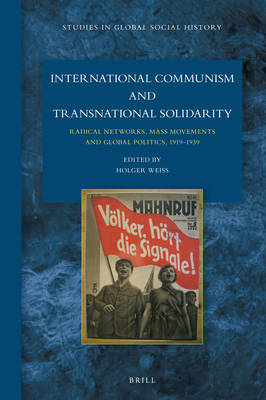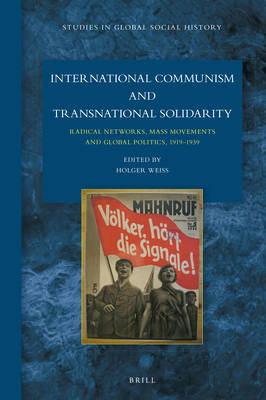
- Afhalen na 1 uur in een winkel met voorraad
- Gratis thuislevering in België vanaf € 30
- Ruim aanbod met 7 miljoen producten
- Afhalen na 1 uur in een winkel met voorraad
- Gratis thuislevering in België vanaf € 30
- Ruim aanbod met 7 miljoen producten
Zoeken
International Communism and Transnational Solidarity: Radical Networks, Mass Movements and Global Politics, 1919-1939
€ 250,95
+ 501 punten
Omschrijving
This book provides an analysis of the articulation and organisation of radical international solidarity by organisations that were either connected to or had been established by the Communist International (Comintern), such as the International Red Aid, the International Workers' Relief, the League Against Imperialism, the International of Seamen and Harbour Workers and the International Trade Union Committee of Negro Workers. The guiding light of these organisations was a radical interpretation of international solidarity, usually in combination with concepts and visions of gender, race and class as well as anti-capitalism, anti-imperialism, anti-colonialism and anti-fascism. All of these new transnational networks form a controversial part of the contemporary history of international organisations. Like the Comintern these international organisations had an ambigious character that does not fit nicely into the traditional typologies of international organisations as they were neither international governmental organisations nor international non-governmental organisations. They constituted a radical continuation of the pre-First World War Left and exemplified an attempt to implement the ideas and movements of a new type of radical international solidarity not only in Europe, but on a global scale.
Contributors are: Gleb J. Albert, Bernhard H. Bayerlein, Kasper Braskén, Fredrik Petersson, Holger Weiss.
Contributors are: Gleb J. Albert, Bernhard H. Bayerlein, Kasper Braskén, Fredrik Petersson, Holger Weiss.
Specificaties
Betrokkenen
- Uitgeverij:
Inhoud
- Aantal bladzijden:
- 392
- Taal:
- Engels
- Reeks:
- Reeksnummer:
- nr. 26
Eigenschappen
- Productcode (EAN):
- 9789004324817
- Verschijningsdatum:
- 1/12/2016
- Uitvoering:
- Hardcover
- Formaat:
- Genaaid
- Afmetingen:
- 155 mm x 236 mm
- Gewicht:
- 2313 g

Alleen bij Standaard Boekhandel
+ 501 punten op je klantenkaart van Standaard Boekhandel
Beoordelingen
We publiceren alleen reviews die voldoen aan de voorwaarden voor reviews. Bekijk onze voorwaarden voor reviews.







